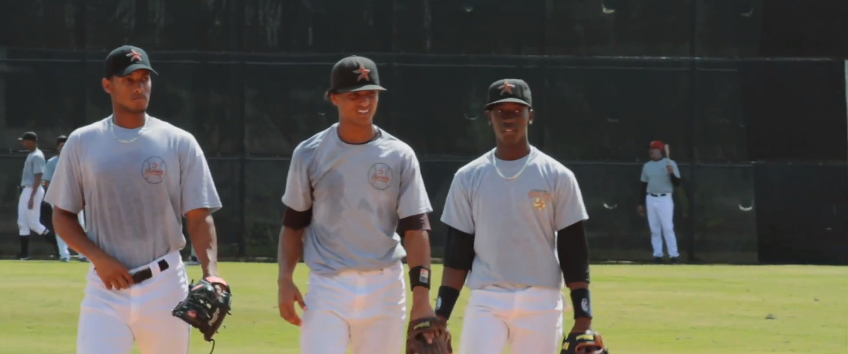
“Ballplayer: Pelotero”
While baseball certainly plays second fiddle to American football in the U.S. — perhaps even third behind the NBA — it is hugely popular in the Dominican Republic. Out of a total island population of 10 million people, over 10% of all active Major League players last year hailed from the Dominican Republic. From Vladimir Guerrero to Hanley Ramirez, the country’s supply of past and present top tier talents is a testament to the debt Major League Baseball owes it.
The system is far from mutually beneficial however, with hundreds of young Dominican players vying every year to even get noticed by one Major League scout and sign a contract potentially worth several million dollars. And while a $2.5 million signing bonus is chump change to the likes of Josh Hamilton and Prince Fielder, it goes a long way in helping many of these young boys and their families, and that’s where Ballplayer: Pelotero comes in.
Pelotero follows two young Dominican prospects and their efforts to sign Major League contracts. The first is a young shortstop named Miguel Sano, widely regarded at the time of production as the top unsigned Dominican prospect. The other is Jean Carlos Batista, a player who shows promise but is rough around the edges and inconsistent in his performance, as likely to whiff on a third strike as he is to gracefully turn a double play. Narrated by John Leguizamo (for some reason) and produced by disgraced Red Sox manager/laughingstock Bobby Valentine, Pelotero tracks both Miguel and Jean Carlos’ progress through various scouting programs and the financial and emotion impact their experiences have on themselves and their families.
Through such a sharp focus in subject, Pelotero unearths a cultural barrier of mistrust in MLB’s courting of unsigned international talent — that is MLB’s skepticism of a Dominican player’s age. It might sound ridiculous to Americans, but many Dominican players either possess inaccurate birth records or outright falsify information about their age, presenting themselves as younger to scouts and thereby raising their ceiling for talent — and money of course. This is nothing new, and Major League clubs have some justification for questioning prospects’ backgrounds. Future Hall of Famer Albert Pujols is an active player who still receives skepticism over his “real” age. The mistrust goes beyond birthdays, too. In 2012, Dominican pitcher Roberto Hernández was arrested for falsely identifying himself as “Fausto Carmona” to obtain a U.S. visa.
Pelotero situates this mistrust as a pivotal obstacle for prospects, and in the case of Miguel Sano and the Pittsburgh Pirates’ low-balling of him, an example of a baseball franchise taking advantage of an unfortunate situation. Both Batista and Sano’s ages come into question, and while Batista’s case has much more uncertainty, Sano’s widely-publicized battle with MLB investigators really takes center stage here. At one point, Pelotero even commits to its grittier aesthetic tendencies and incorporates real audio and video footage of a Pittsburgh scout leveraging Sano’s assumed age against the young player to cut a cheaper contract. The business of courting international prospects is shown to be a seedy one, and while Pelotero exemplifies as much in its two potential stars, its personalized stories are also to its detriment.
At times, Pelotero doesn’t advance the Dominican Republic’s story far enough, or at least any further than “These two players need money to help their families.” That’s a perfectly noble motivation, but Pelotero clocks in at a fleeting 72 minutes, proof enough that it could have benefited from an additional 5 of further context: take a moment to recognize the disconnect between MLB and its unappreciated talent pool or explain how scouting camps and their shiny new equipment are the exception to the rule in a country where many boys play with tennis balls, sticks for bats, and no gloves. The Houston Astros’ scouting facility where Batista tries out sure looks nice, but the freshly-trimmed grass is a far cry from the average state of baseball accommodations. Even in some of its best-intended attempts to show this disparity, Pelotero only goes halfway, jumping right into the coaches, batting practice sessions and pitching machines. Following his eventual exoneration, Sano signs with the Minnesota Twins for $3 million, buying a big house for his family and a shiny new SUV that he rolls through the Dominican streets with, passing by rundown homes and stores and talking with impoverished children playing on sidewalks. The economic disconnect is striking; Director Trevor Martin seems to think the brief images are sufficient enough.
Pelotero is titillating in the bits and pieces it focuses on, but its narrow scope means it never earns the wider implications it aims for. Major League Baseball might not want a sharper documentary, but the hundreds of Dominican players certainly deserve one on the uneven returns their contributions have seen. After all, the Dominican Republic finished atop this year’s World Baseball Classic, and even though you’re probably Googling what the heck a “Baseball Classic” even is, rest assured they’ve been partying all week long.
- Ballplayer: Pelotero is available on Netflix Instant, Hulu Plus, and for digital download
